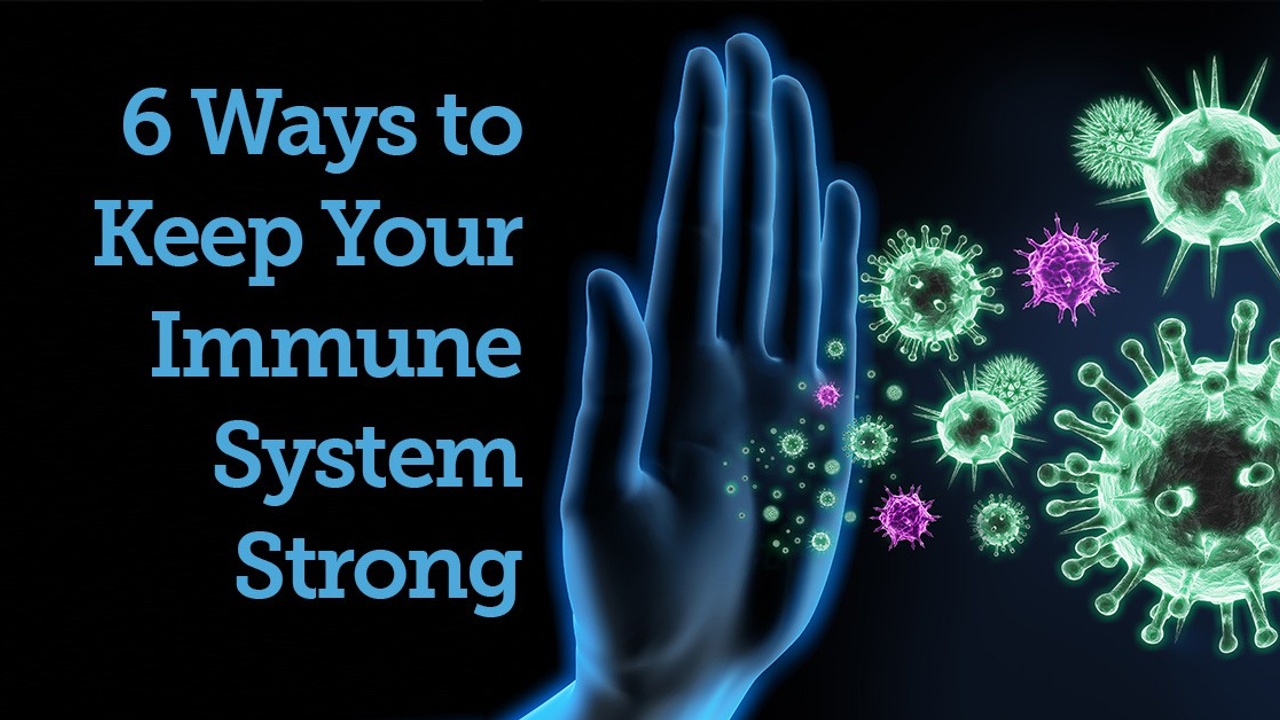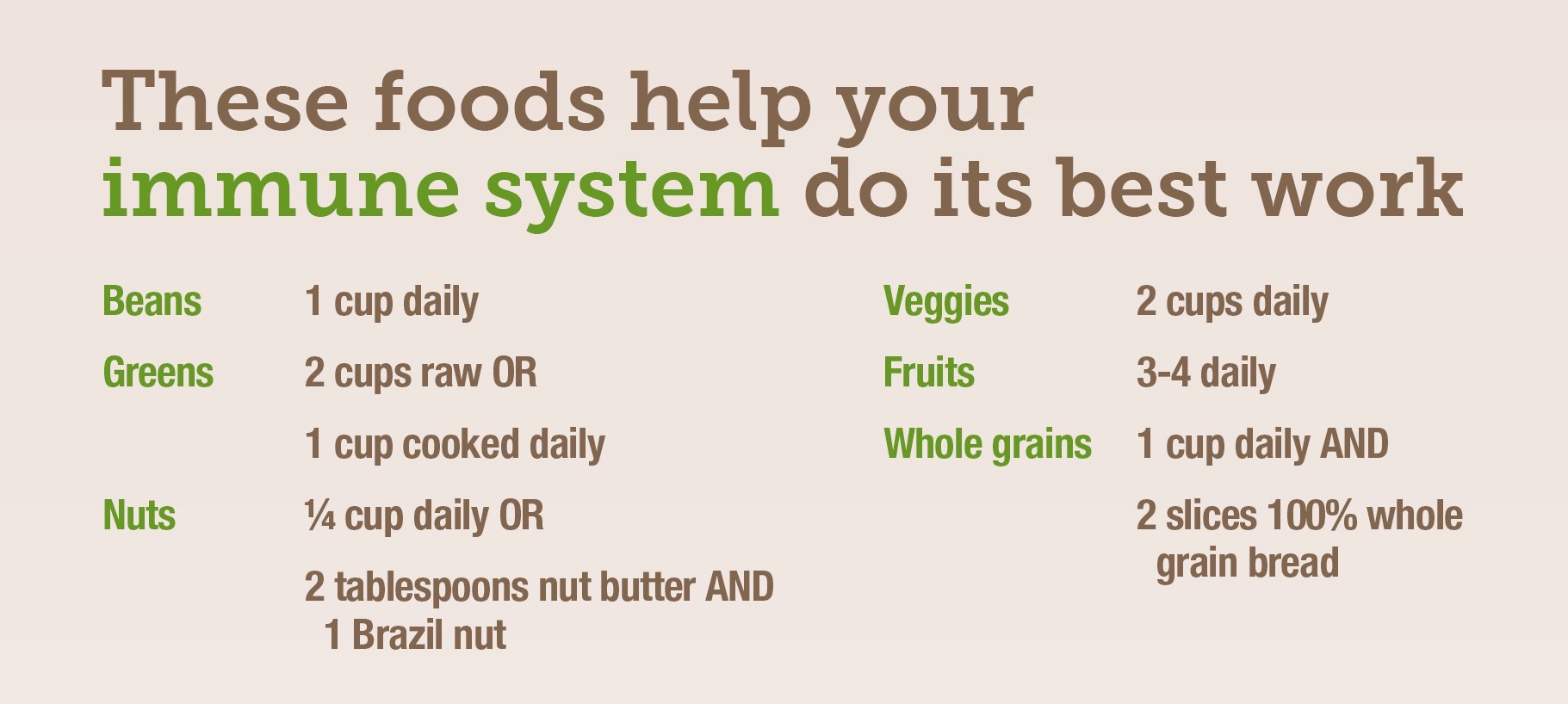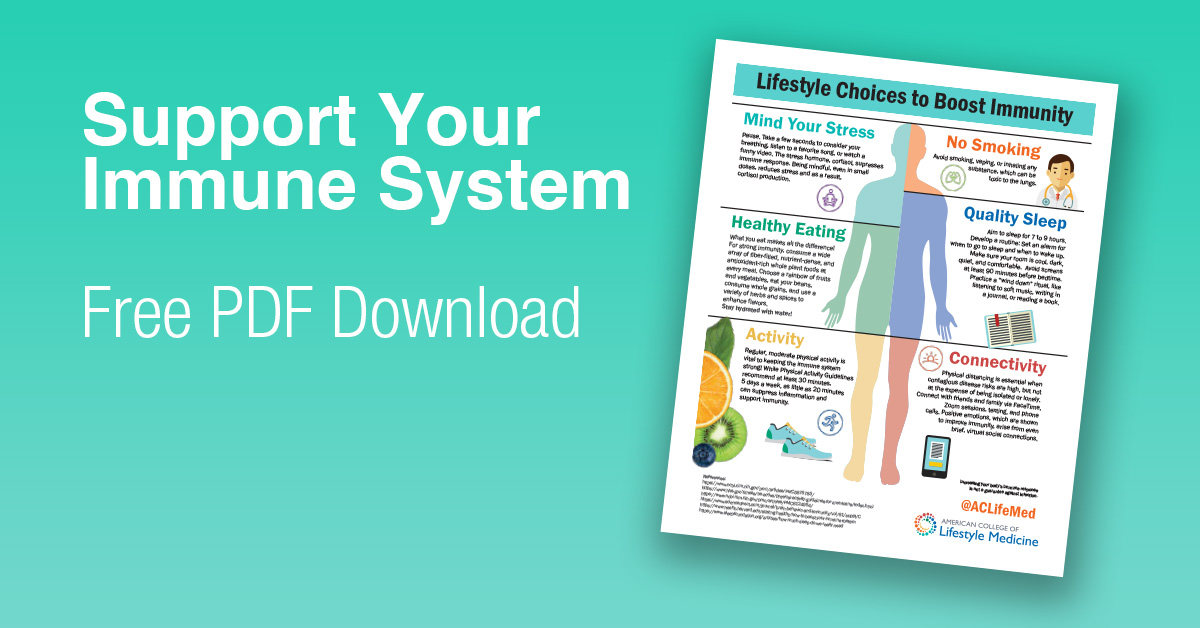6 Ways to Keep Your Immune System Strong

Healthy, vibrant living is always dependent on a well-functioning immune system. That’s because the immune system is our body’s defense system, protecting us from harmful, foreign invaders, such as bacteria and viruses. This system is an extremely complex network of organs, tissues, proteins and many different types of white blood cells, all involved in constant, complicated communications in an effort to keep us well. Our whole body is under round-the-clock surveillance, immune cells continually circulating throughout the bloodstream and lymphatic system looking for pathogens that cause disease.(1,2)
Because immunity involves a pervasive, intricate system of many, many parts, it’s impossible that one single “magic bullet” food, supplement, herb, oil or pill could fortify all aspects of immunity.
Our best, evidence-based strategy for ensuring robust immunity is to live a healthy lifestyle that supports the immune system’s ability to function in a brilliant, balanced manner. That means a well-functioning immune system is more a matter of choice than chance. As illustrated below, there are 6 areas of lifestyle choices that support a strong immune system. Let’s take a closer look at each one.
Click here to access the PDF download.
6 Healthy Habits for Your Immune System
#1 Mind Your Stress
Stress increases levels of the stress hormone cortisol, and cortisol suppresses the immune response. It’s not occasional stress but chronic stress that impairs the immune system.(3)
Start Here: The first step involves doing the personal work of figuring out what triggers your stress. Track your stressors on paper, phone, tablet or computer. Then determine what stressors can be avoided and devise a strategy to avoid them. Unavoidable stressors require learning how to change your reaction to them. Here are some options to help you do that:
- Embrace relaxation techniques: deep breathing, meditation, prayer, yoga, engaging in a favorite hobby, exercise
- Use Cognitive Behavioral Therapy (CBT): talk therapy that focuses on helping us change our thinking in a positive way. Find a professional in your area and read about how it can help you.
#2 No Smoking
Nicotine creates an immediate, temporary sense of relaxation, which is why people smoke when feeling stressed. But smoking actually increases stress by increasing anxiety and tension. Not surprisingly, the 250 known harmful chemicals in cigarette smoke weaken the normal defensive function of the immune system.(4-6) Break the habit of smoking and avoid vaping or inhaling any substance which can be toxic to the lungs.
Stop Now: Visit Smokefree.gov for an abundance of free information and resources to help you quit. You can break the habit!
#3 Quality Sleep
Habitual sleep deficiency depresses the immune system, triggers low-grade inflammation and increases our susceptibility to infections and disease. In contrast, consistent, good-quality sleep enhances immune defenses.(7-9)
Aim For: 7-9 hours of quality sleep a night.
Here are four tips to help you get better quality sleep, which you can remember by the acronym HARP:
- Have a regular sleep time
- Avoid all screens at least 90 minutes before bedtime
- Room is cool, dark, quiet and comfortable
- Practice a wind down ritual
For more sleep tips watch our Member Workshop with sleep expert Valerie Cacho MD, and visit the Sleep Foundation’s website. If these measures do not help, consult your doctor or a sleep specialist.
#4 Connectivity
Because we are social creatures, connectivity is essential for health. It refers to positive, social connections with family and friends, which promotes positive emotions. Positive emotions improve immune responses, enhancing resistance to infections and disease. Social isolation, on the other hand, fosters negative emotions, which suppress the immune system.(10-13)
Get Connected: Be intentional about staying connected with family and friends in meaningful ways that work for you. Get creative about it. Here are a few suggestions: cook and eat together, play games, read books, watch videos, take a drive, exercise or engage in physical activities everyone enjoys.
Consider staying connected with loved ones and favorite people in your life virtually via Zoom, FaceTime, Skype, texting and phone calls. Create special virtual events around birthdays, holidays and other meaningful dates. Positive emotions arise from even brief virtual social connections.
#5 Activity
We know regular physical activity is foundational to healthy living, so it’s not surprising it’s essential for a healthy immune system. After exercising there is greater immune cell surveillance and short-lived, enhanced immune responses. Regular, moderate physical activity has anti-inflammatory effects in the body and decreases the risk of infections, especially upper respiratory tract infections.(14-16)
Get Moving: Evidence indicates any amount of physical activity is beneficial, no matter how small. As little as 20 minutes can suppress inflammation and support immunity.
When you’re ready to focus on increasing your physical activity, aim for 150 minutes a week of moderate intensity physical activity, which can be broken up in the way that fits your schedule best. Example: 30 minutes, five days a week.
In order to increase adherence:
- Do what you enjoy
- Mix it up to avoid boredom
- Include a family member or friend, whenever possible, for motivation and accountability
#6 Healthy Eating
Like any fighting force, the immune system army marches on its stomach. The white blood cell warriors need to be supported by a way of eating that meets the following three criteria:
- Anti-inflammatory – The food we eat on a daily basis can be anti-inflammatory, meaning it helps suppress the unnecessary, chronic activation of the immune system, or it can be pro-inflammatory, meaning it promotes, like a smoldering fire, the chronic, low-grade inflammatory activation of the immune system, which places it in a weakened position for mounting a healthy immune response to an invading bacteria or virus. Science has shown a plant predominant eating pattern, focused on fruits, vegetables, whole grains, beans, nuts, olive oil and fatty fish, to be an anti-inflammatory way of eating. In contrast, the Standard American Diet, characterized by regular intake of highly processed foods, fried foods, sugar-sweetened beverages, refined grains, red and processed meat, margarine, shortening and lard, is a pro-inflammatory eating pattern associated with increased inflammatory markers.
- Abundant in fiber – Seventy to eighty percent of our immune system is in the gut, or large intestine. When we have a healthy gut, we have a strong immune system, and a healthy gut is fueled by fiber.
- Rich in vitamins and minerals – Studies have shown that our immune system can be strengthened by optimal levels of the following vitamins and minerals:
- Vitamins: A, B6, B12, C, D, E, folate
- Minerals: iron, zinc, copper, selenium
A plant-predominant way of eating, composed largely of whole, unprocessed fiber foods, meets all three criteria.(17-29) The Mediterranean Diet is one example; Full Plate is another.
Fill Your Plate: Work up to filling at least 75% of your plate at every meal with whole, unprocessed fiber foods: fruits, vegetables, beans, whole grains, nuts and seeds.
Here are some daily guidelines to work toward:

Vitamin B12 – Since natural fiber foods are plant foods, and plants don’t make B12, strict vegetarians and vegans are at risk for developing vitamin B12 deficiency. Bariatric surgery as well as several health conditions can also increase risk of deficiency. For these reasons, we recommend you consult with your doctor to determine your present blood levels and the best diet and supplementation regimen for you. Read here to learn more.
Vitamin D – For most adults, vitamin D deficiency is not a concern. However, some groups — particularly people who are obese, who have dark skin and who are older than age 65 — may have lower levels of vitamin D due to their diets, lack of sun exposure or other factors. Too much vitamin D is linked to other health problems. If you’re concerned about whether you’re getting enough vitamin D, check with your doctor to determine your present blood levels and whether a supplement would be beneficial. Read here to learn more.
The Good News
You can start today making lifestyle choices that support a healthy immune system:
- Reduce your stress
- Stop smoking
- Get quality sleep
- Maintain positive connections
- Get moving
- Eat more whole, unprocessed fiber foods
That means a healthier you!
The Full Plate Living Membership has many free programs, recipes, workshops, and a private community to help you enjoy more of these whole, unprocessed fiber foods. Join today.
You can also watch our previously recorded Member Workshop on 6 Ways to Keep Your Immune System Strong.
If you are under medical supervision for any reason, consult with your doctor before following any of these recommendations.
References
- https://www.niaid.nih.gov/research/immune-system-overview
- https://www.health.harvard.edu/staying-healthy/how-to-boost-your-immune-system
- Dragoş D, Tănăsescu MD. The effect of stress on the defense systems. J Med Life. 2010;3(1):10-18.
- Qiu F, Liang CL, Liu H, et al. Impacts of cigarette smoking on immune responsiveness: Up and down or upside down?. Oncotarget. 2017;8(1):268-284. doi:10.18632/oncotarget.13613
- https://www.cancer.gov/about-cancer/causes-prevention/risk/tobacco/cessation-fact-sheet
- https://www.cdc.gov/tobacco/basic_information/e-cigarettes/Quick-Facts-on-the-Risks-of-E-cigarettes-for-Kids-Teens-and-Young-Adults.html
- Besedovsky L, Lange T, Haack M. The Sleep-Immune Crosstalk in Health and Disease. Physiol Rev. 2019;99(3):1325-1380. doi:10.1152/physrev.00010.2018
- Ibarra-Coronado EG, Pantaleón-Martínez AM, Velazquéz-Moctezuma J, et al. The Bidirectional Relationship between Sleep and Immunity against Infections. J Immunol Res. 2015;2015:678164. doi:10.1155/2015/678164
- https://www.sleepfoundation.org/sleep-hygiene/healthy-sleep-tips
- Barak Y. The immune system and happiness. Autoimmun Rev. 2006 Oct;5(8):523-7. doi: 10.1016/j.autrev.2006.02.010. Epub 2006 Mar 21. PMID: 17027886.
- Matsunaga M, Isowa T, Kimura K, Miyakoshi M, Kanayama N, Murakami H, Sato S, Konagaya T, Nogimori T, Fukuyama S, Shinoda J, Yamada J, Ohira H. Associations among central nervous, endocrine, and immune activities when positive emotions are elicited by looking at a favorite person. Brain Behav Immun. 2008 Mar;22(3):408-17. doi: 10.1016/j.bbi.2007.09.008. Epub 2007 Oct 30. PMID: 17977695.
- Dillon KM, Minchoff B, Baker KH. Positive emotional states and enhancement of the immune system. Int J Psychiatry Med. 1985-1986;15(1):13-8. doi: 10.2190/r7fd-urn9-pq7f-a6j7. PMID: 4055243.
- Cacioppo JT, Hawkley LC, Norman GJ, Berntson GG. Social isolation. Ann N Y Acad Sci. 2011;1231(1):17-22. doi:10.1111/j.1749-6632.2011.06028.x
- Davison G, Kehaya C, Wyn Jones A. Nutritional and Physical Activity Interventions to Improve Immunity. Am J Lifestyle Med. 2014;10(3):152-169. Published 2014 Nov 25. doi:10.1177/1559827614557773
- https://health.gov/sites/default/files/2019-09/Physical_Activity_Guidelines_2nd_edition.pdf
- https://www.cdc.gov/physicalactivity/basics/measuring/index.html
- https://www.health.harvard.edu/staying-healthy/quick-start-guide-to-an-antiinflammation-diet
- https://www.health.harvard.edu/staying-healthy/foods-that-fight-inflammation
- Bulsiewicz, Will. Fiber Fueled. New York, AVERY, 2020.
- Calder PC, Jackson AA. Undernutrition, infection and immune function. Nutr Res Rev. 2000 Jun;13(1):3-29. doi: 10.1079/095442200108728981. PMID: 19087431.
- Maggini S, Wintergerst ES, Beveridge S, Hornig DH. Selected vitamins and trace elements support immune function by strengthening epithelial barriers and cellular and humoral immune responses. Br J Nutr. 2007 Oct;98 Suppl 1:S29-35. doi: 10.1017/S0007114507832971. PMID: 17922955.
- Sassi F, Tamone C, D'Amelio P. Vitamin D: Nutrient, Hormone, and Immunomodulator. Nutrients. 2018;10(11):1656. Published 2018 Nov 3. doi:10.3390/nu10111656
- Prietl B, Treiber G, Pieber TR, Amrein K. Vitamin D and immune function. Nutrients. 2013 Jul 5;5(7):2502-21. doi: 10.3390/nu5072502. PMID: 23857223; PMCID: PMC3738984.
- Gombart AF, Pierre A, Maggini S. A Review of Micronutrients and the Immune System-Working in Harmony to Reduce the Risk of Infection. Nutrients. 2020 Jan 16;12(1):236. doi: 10.3390/nu12010236. PMID: 31963293; PMCID: PMC7019735.
- Venter C, Eyerich S, Sarin T, Klatt KC. Nutrition and the Immune System: A Complicated Tango. Nutrients. 2020;12(3):818. Published 2020 Mar 19. doi:10.3390/nu12030818
- Iddir M, Brito A, Dingeo G, et al. Strengthening the Immune System and Reducing Inflammation and Oxidative Stress through Diet and Nutrition: Considerations during the COVID-19 Crisis. Nutrients. 2020;12(6):1562. Published 2020 May 27. doi:10.3390/nu12061562
- Li J, Lee DH, Hu J, Tabung FK, Li Y, Bhupathiraju SN, Rimm EB, Rexrode KM, Manson JE, Willett WC, Giovannucci EL, Hu FB. Dietary Inflammatory Potential and Risk of Cardiovascular Disease Among Men and Women in the U.S. J Am Coll Cardiol. 2020 Nov 10;76(19):2181-2193. doi: 10.1016/j.jacc.2020.09.535. PMID: 33153576; PMCID: PMC7745775.
- Anand SS, Hawkes C, de Souza RJ, et al. Food Consumption and its Impact on Cardiovascular Disease: Importance of Solutions Focused on the Globalized Food System: A Report From the Workshop Convened by the World Heart Federation. J Am Coll Cardiol. 2015;66(14):1590-1614. doi:10.1016/j.jacc.2015.07.050
- Zhu F, Du B, Xu B. Anti-inflammatory effects of phytochemicals from fruits, vegetables, and food legumes: A review. Crit Rev Food Sci Nutr. 2018 May 24;58(8):1260-1270. doi: 10.1080/10408398.2016.1251390. Epub 2017 Jun 12. PMID: 28605204.
Full Plate Living is a small-step approach with big health outcomes. It's provided as a free service of Ardmore Institute of Health.


